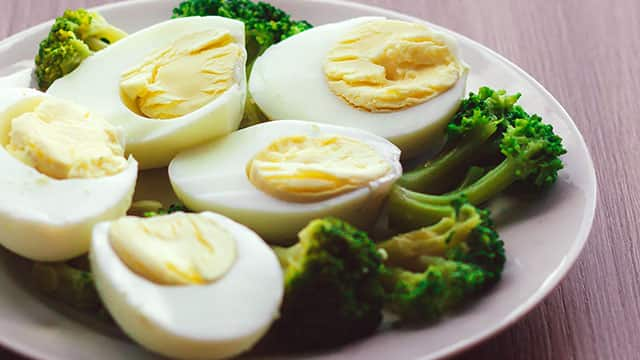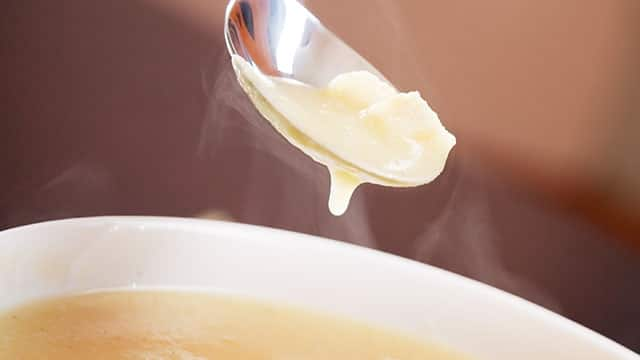Why Take Vitamins For Teeth?
Your mouth, teeth, and gums are the first contact points for the nutrients you consume and are essential for kicking off the digestion process. In fact, according to the International Journal of Environmental Research and Public Health, the process of chewing allows you to extract the greatest possible amount of nutrients from the food you eat. Conversely, nutrient deficiencies can lead to oral conditions like inflammation and tooth loss. That means that consuming the right vitamins through food and supplements can promote healthy teeth and gums. Here are five essential vitamins for teeth and gum health.
1. Calcium
Calcium isn’t just good for your bones; it’s good for your teeth, too. According to the National Institutes of Health, calcium is one of the most important minerals in the human body, as it helps form and maintain strong bones and teeth. Curious as to how you can consume calcium? You might already be doing it. Dairy products like milk and yogurt have a type of calcium that’s easy for your body to absorb. Canned salmon and sardines are also good sources. If you do not consume meat or dairy, or want to add more calcium-rich vegetables to your diet, try broccoli, collards, kale, mustard greens, turnip greens, and bok choy or Chinese cabbage or nuts like almonds, brazil nuts, sunflower seeds, and tahini. Keep in mind that to ensure the calcium stays in these foods, cook them in a small amount of water for a short time, like steaming or sauteing, instead of boiling. Additionally, you can also take calcium as a supplement.
2. Phosphorus
Phosphorous is another essential vitamin for healthy teeth. Phosphorus helps the body absorb and use calcium and strengthens teeth by protecting and rebuilding tooth enamel. If you’re looking to add more phosphorus to your diet, try to incorporate meat, milk, and whole grains. Fish, eggs, and protein-rich foods are also excellent sources. Luckily, most people get enough of this vitamin in their regular diet without the need for supplements.
3. Vitamin D
Vitamin D plays a significant role in keeping your teeth healthy—according to a 2020 article, Vitamin D Deficiency and Oral Health: A Comprehensive Review, vitamin D deficiencies can lead to several oral health disorders, like gingival inflammation, cavities, and gum disease. That’s because it plays a crucial role in bone and tooth mineralization. But don’t worry—consuming vitamin D is easy via supplements. It’s also present in oily fish like salmon, mackerel, and herring. Additionally, some foods are vitamin D fortified, like milk and breakfast cereals.
4. Vitamin C
Vitamin C is not only good for your teeth; it’s an excellent vitamin for gums, too. Vitamin C helps keep the connective tissues in your gums healthy and strong, which hold your teeth in place—which means deficiencies can lead to bleeding gums and gum disease. Further, vitamin C supplements also reduced erosive tooth wear in early childhood. You’re likely getting a lot of vitamin C in your diet, as it’s present in citrus fruits, peppers, sweet potatoes, broccoli, berries, and kale. Supplements are also widely available.
5. Vitamin A
Vitamin A is not only good for your eyes and skin—but it’s also great for your mouth, particularly your saliva production. Saliva helps break down food and also cleans bacteria from in between your teeth. You can find Vitamin A in orange-colored fruits and vegetables, like carrots, sweet potatoes, bell peppers, plus fish and egg yolks. It’s also available as a supplement.
When to Take Vitamins
A healthy diet can provide you with a lot of these vitamins for teeth and gums. That being said, taking supplements may be a better option in some cases. If you’re wondering if you should take a supplement, talk to your dentist or physician, as some dietary supplements may interact or interfere with some prescription medications.
If you’re maintaining a healthy and balanced diet full of whole fruits and vegetables, you’re probably already consuming many of these teeth-friendly nutrients. And if you’re concerned about your vitamin levels, chat with your dentist about what supplements or foods you could add to your diet. Understanding how these vitamins impact your teeth can help your oral care in the long term. Now you know what vitamins are essential to your oral health, why not try a delicious new recipe with these nutrient-packed foods?
Oral Care Center articles are reviewed by an oral health medical professional. This information is for educational purposes only. This content is not intended to be a substitute for professional medical advice, diagnosis or treatment. Always seek the advice of your dentist, physician or other qualified healthcare provider.
ORAL HEALTH QUIZ
What's behind your smile?
Take our Oral Health assessment to get the most from your oral care routine
ORAL HEALTH QUIZ
What's behind your smile?
Take our Oral Health assessment to get the most from your oral care routine















